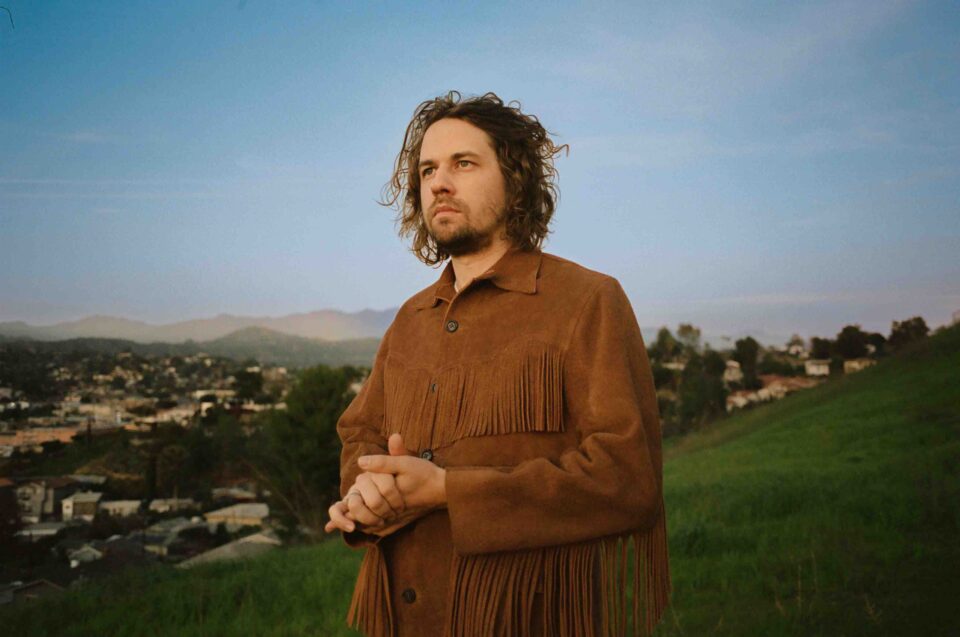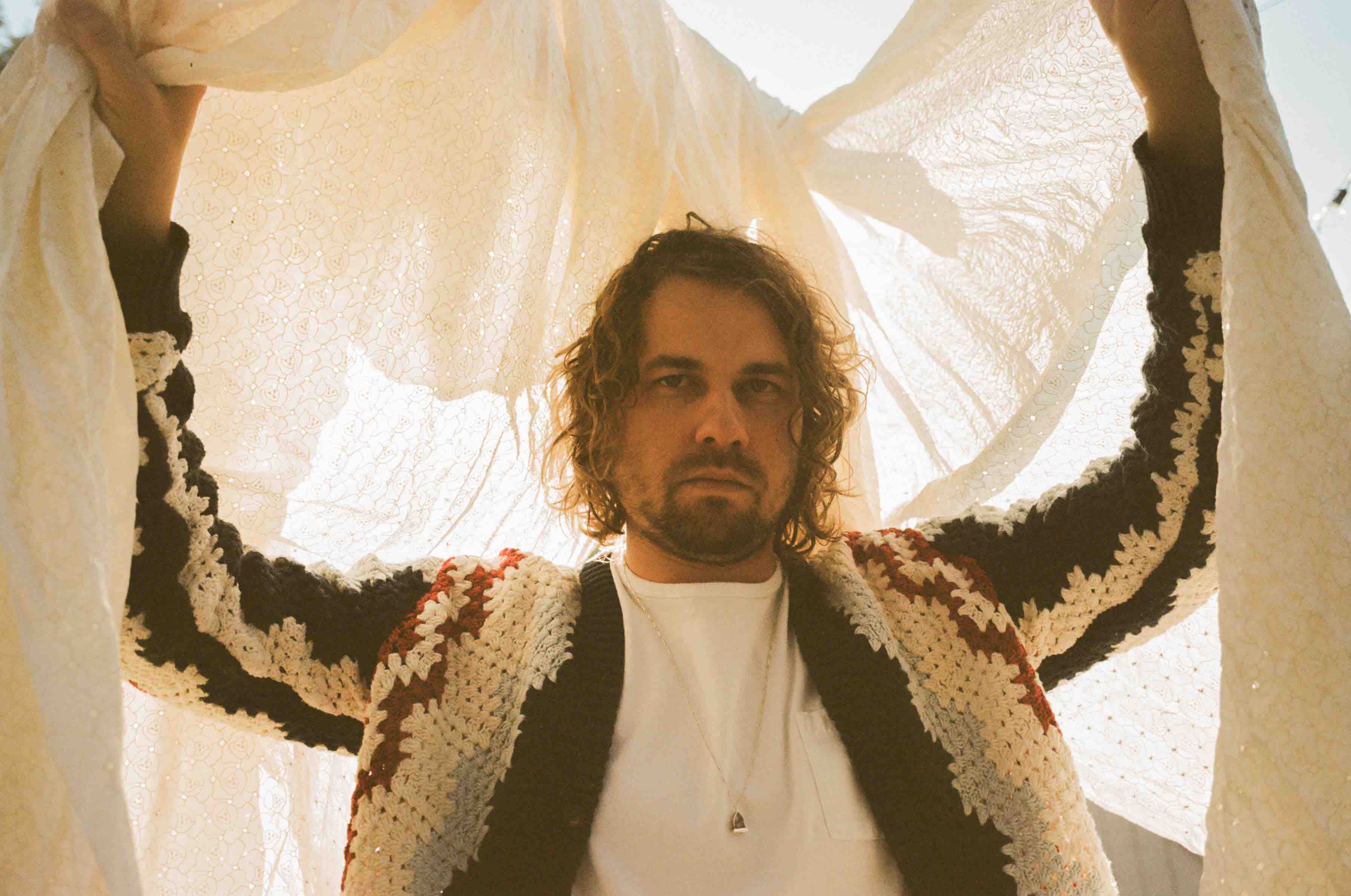We’ve all felt the pull of old photos. Whether it’s a Facebook memory popping up on the feed or dusty scrapbooks from the attic, there’s something about these timestamped moments that feels almost gravitational. What is it, exactly, that’s so comforting about looking back, about nostalgia, about the frozen reality of a candid shot? This is what Kevin Morby’s latest record, the frankly titled This Is a Photograph, means to explore. This may be the seventh record Morby’s released in less than 10 years, but he’s not one to repeat himself—especially not thematically. Each of his albums is very much rooted in time and place, and Photograph is no exception. Morby found the past to be especially fruitful ground, looking back as a way to both escape and process the present.
During a recent phone conversation, Morby spoke with me about just this impulse. Recording the album in Memphis, he spent a lot of time thinking about one his heroes and songwriting inspirations, Jeff Buckley, who drowned not far from where Photograph was recorded. There’s a moment on the record where we hear that river flowing, Morby having caught this living force in the very moment that it inspired him most. “I like the idea that I’m catching the river on a certain day and that can’t ever really be recreated,” he tells me. Perhaps this is why photos have such a power over us: because they cannot be replicated, because they capture what is gone.
I was hoping you could talk about the germ of the idea to shape this album around photographs, and how it worked in practice as you were using that for inspiration.
I discovered a box of family photographs after my father had this medical emergency. We got back from the hospital and we were having this sort of tender family moment. This happened in January 2020, and then I accumulated more ideas as time went on. I came up with this concept of writing a series of poems all beginning with “this is a photograph,” and then I would depict something. When the pandemic hit and I had all this time on my hands I stumbled upon this riff. Once I had that song, I knew it felt strong enough to spearhead a new collection of songs that could become a record.
“I did a bunch of different poses for the cover but ultimately went with the one where my face is obscured. It’s because I didn’t want to be the focal point, I wanted the photographs to be the focal point.”
I read that your album covers are particularly important to you. Can you tell me a little bit about what went into the design of Photograph?
I had a couple ideas floating around, but the one that seemed to stick out most was of me in front of walls that were holding all these photos that would each be its own Easter egg for the record—photos I took during the writing and recording process, as well as old family photos from that box that also have to do with the subject matter within the record. I feel like if you get to know the record, get to know the music and the lyrical content, there’ll be a lot of stuff that sticks out to you. I did a bunch of different poses for the cover but ultimately went with the one where my face is obscured. It’s because I didn’t want to be the focal point, I wanted the photographs to be the focal point.
For each record you’ve made, you tend to structure it around one main idea. Do you use these as a guardrail to help you as a songwriter, or is it more of just a jumping off point?
Definitely more of a jumping off point. My method of writing is that I never really know what I’m going to write about—stuff just starts to come out, and then I’ll notice threads between certain songs. I’ll have a pile of eight songs and I’ll notice, well, six of these keep coming back to certain imagery or share certain characteristics. Once I notice that and become aware of the thread between songs, then I recognize that an album might be forming. Once the concept is acknowledged I can go from there. But getting there is something that always happens spontaneously and always surprises me.

I wanted to talk a bit about “Bittersweet, TN” and how surprising it was to have Erin Rae’s voice come in as the lead on that song. What led to that decision?
When you have a guest sing on something it’s always this basic formula where you sing first and they come in second. I love Erin’s voice so much, I just thought the song was perfect for her to the point where I thought she could maybe just sing the whole thing. But then I decided I wanted to sing with her. To get the best of both worlds, I decided to have her on the jump of the song. I imagine if you’re listening to the record, when the third song plays your ears might kind of perk up. I like the idea of keeping the listener on their toes.
“Through doing interviews I’ve become conscious of the fact that I was feeling very uninspired by the present, and the past became this comfortable, warm place for me to exist in.”
You’ve talked about new experiences being a primary inspiration for you as a songwriter, so I’m wondering how it's been writing over the last few years given the kind of static nature of our lives over that time. Is that why you took that trip to Memphis?
I found the pandemic very uninspiring, as I’m sure a lot of us did. Through doing interviews I’ve become conscious of the fact that I was feeling very uninspired by the present, and the past became this comfortable, warm place for me to exist in. In a way it kind of felt like I was emulating a tour because I’m usually so comfortable on tour and I travel so much it's kind of become something I’m very used to. I had been in my house in Kansas City for months, so I needed to get away. So it was kind of nice to be living out of this hotel. It felt transient like I was emulating tour.
At the same time it was really amazing to work on this set of songs in a way that I’ve never done with my previous work because this time there was no deadline. There wasn’t any kind of attempt to sandwich writing in between tours and booking studio time. It was just me and the songs in this strange city that isn’t my city. Memphis is such a beautiful, resilient, brave, strong city that’s been through so much. I found it very comforting to be there during this global pandemic because I just felt Memphis, of all cities in America, has really been through a lot. I found it really inspiring.
Can you tell me a bit about the field recordings that pop up on “A Coat of Butterflies”?
I took those along the Mississippi River. That song’s about Jeff Buckley and I found the entry point where he drowned and I collected some audio samples there. There’s some sample of the Memphis Zoo on the song “Disappearing,” which is also sort of about Jeff Buckley. He had applied to a job at that zoo shortly before his death. I like the idea of samples being on the record because the whole idea of the album title is that the music is a photograph, the music is this snapshot of time. So I like the idea that I’m catching the river on a certain day and that can’t ever really be recreated.
I wanted to ask you about “Stop Before I Cry”—am I correct in saying this is the first song you’ve written specifically about your relationship with Katie?
Well there were a few songs on Sundowner about Katie, but definitely nothing as candid, because I wasn’t using her name. When you’re existing in your own little world while writing a song, you’re so comfortable there. Before you show the song to anyone it’s yours and no one else's, but then when you record it and it comes out it sort of belongs to everyone and you can feel put on display.
“I like the idea of samples being on the record because the whole idea of the album title is that the music is this snapshot of time. So I like the idea that I’m catching the river on a certain day and that can’t ever really be recreated.”
I think if Katie and I weren’t together it would maybe be a crazy song to release, but since we are together it’s different. It’s definitely a vulnerable song, but I think that’s part of the power of it. When I recorded it it made me think of old Rolling Stones songs or Townes Van Zandt songs where they name people, and how I never thought about it really. I always thought of names as just a word to put in a song, but then I was like, “You know, there’s stories behind all of these names.” Someone might hear “Stop Before I Cry” 20 years from now and think maybe “Katie” just sounded good.
How do you view a record at this point in its life cycle where you’ve had it done for such a long time but it's just coming out in the world? Are you mentally already plotting and planning the new one?
I feel more connected to Photograph than any other record of mine because I wasn’t actively doing an album cycle while writing and recording. I feel like I got very close to it because it was the only thing I was thinking about. Now that it’s coming out, even though I’ve written some new songs here and there, it’s still in the forefront of my mind—which, usually with the record in this part of the process, I’m getting ready to go in and mix and master the next one. Probably for the first time ever the record getting ready to come out is the one I’m thinking about the most. FL







